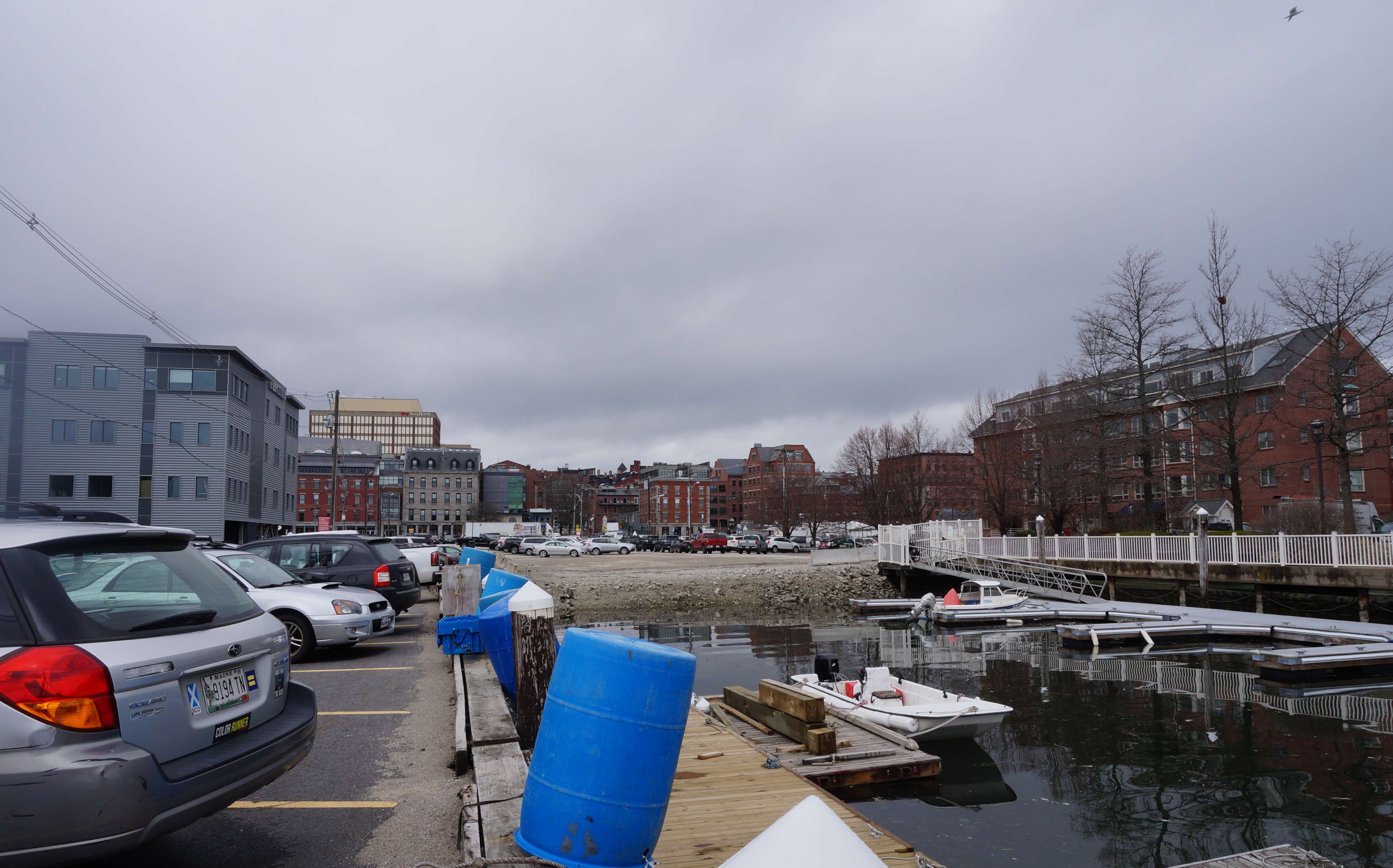
Portland waterfront rezoning moves forward, Fisherman's Wharf project doesn't
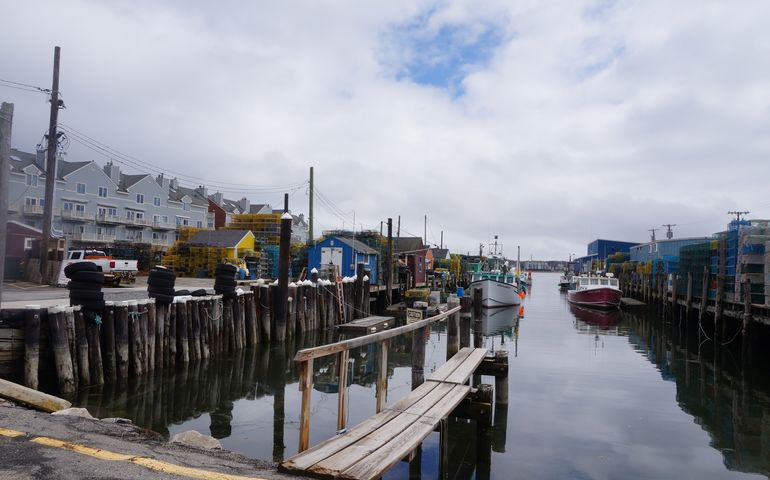 Photo / Maureen Milliken
The working waterfront part of Fisherman's Wharf in Portland, left, where, closer to Commercial Street, a parking lot was slated to be developed into a hotel and office space, prompting protests from fishermen and others and a new look at zoning in the area. The Chandler's Wharf condominiums, at left, spurred similar protests when they were built, resulting in stricter zoning in the area.
Photo / Maureen Milliken
The working waterfront part of Fisherman's Wharf in Portland, left, where, closer to Commercial Street, a parking lot was slated to be developed into a hotel and office space, prompting protests from fishermen and others and a new look at zoning in the area. The Chandler's Wharf condominiums, at left, spurred similar protests when they were built, resulting in stricter zoning in the area.
As the Portland Planning Board moves forward on changes that will restrict commercial development on Commercial Street, the project that prompted it is in limbo, the hotel that was the centerpiece no longer in play.
Bateman Parnters LLC, which had planned a $40 million development for the site, which is currently a parking lot, withdrew the 93-room hotel piece of the plan in January, and says that marine-use friendly aspects that were drawn up after concerns about the working waterfront were raised are on hold.
Proposed zoning amendments under review by the city would prohibit hotels and other lodging from that area.
“No hotel is currently proposed for Fisherman’s Wharf," Bateman spokesman Mark Robinson said Thursday. "I would say that status remains at least until the city finishes its current effort to review waterfront zoning.”
The planning board Tuesday held a workshop on amendments to the zone that comprises the water side of Commercial Street from Deake's Wharf near the Casco Bay Bridge east to the Maine State Pier. The stretch includes 12 wharves and most of the city's commercial fishing operations. The rezoning includes greater restrictions on commercial development that would help preserve the working waterfront.
The Bateman Partners LLC Fisherman's Wharf project was the catalyst for a six-month moratorium on development in the zone, enacted in December, and formation of the Waterfront Working Group, which is charged with finding solutions to concerns about the shrinking working waterfront and increasing development on Commercial Street.
Bill Needelman, the city's waterfront coordinator, told the Planning Board Tuesday, "Zoning isn't the only issue."
Yet it's been the only topic, or primary topic, of eight of the nine Waterfront Working Group meetings, he said. "It's certainly something that needs to be addressed."
Zoning amendments suggested by the group, which include shrinking the commercial overlay of the zone, prohibiting many retail uses and more are an attempt to "recalibrate the balance" between the working waterfront and other uses, he said.
The amendments would prohibit contract or conditional zoning, which is zoning specific to one site and something the Fisherman's Wharf project needed to go forward; reduce the allowable space for first-floor commercial use from 150 feet from Commercial Street to 125 feet; and restrict some retail uses.
Developers would also have to provide an operations management plan that will show the location of all buildings structures on the site and how people and vehicles will circulate.
The planning board will hold a public hearing May 14, and the board's recommendation will go before the city council. The moratorium expires June 15.

Roll of the dice
When the Fisherman's Wharf project was first proposed in 2016, it was a roll of the dice. There were no other hotels in the Waterfront Central Zone on Commercial Street. The zone had restricted commercial use along the 12 piers between the Casco Bay Bridge and the Maine State Pier after a 1987 referendum that was spurred by concerns over waterfront development, including a proposal for Fisherman's Wharf.
A 2010 rezoning eased some of those restrictions, allowing non-marine commercial use in 45% of a building’s ground floor in the zone. That commercial area, the Non Marine Use Overlay Zone, allowed the ground floor commercial use up to 150 feet from Commercial Street, extending it to 500 for Fisherman's Wharf, Union Wharf and Long Wharf, where DiMillo's on the Water is located.
The 2010 rules didn't address hotels, which means the Fisherman's Wharf project needed conditional zoning to proceed.
By October, the project had been before the planning board three times, but residents and fishermen were also talking about another referendum, similar to the one in 1987, to restrict development along the waterfront. Those pushing for the vote made it clear the Fisherman's Wharf plan had prompted the protests.
Bateman Partners isn't new to city development. The firm's most recent project is the 211,000-square-foot Covetrus/Shipyard mixed-use project on Portland's East End.
In January, Bateman Partners withdrew the hotel plan for Fisherman's Wharf and said it would redesign the project to take marine uses into account. But it didn't offers specifics about how the plan would change.
“[Bateman Partners] just spent several months designing new working waterfront features into their project, but events conspired to deny them the chance to present those ideas — to anybody. So it’s time to regroup,” Robinson said in January.
He said Bateman Partners was trying to work with those who were concerned about the project.
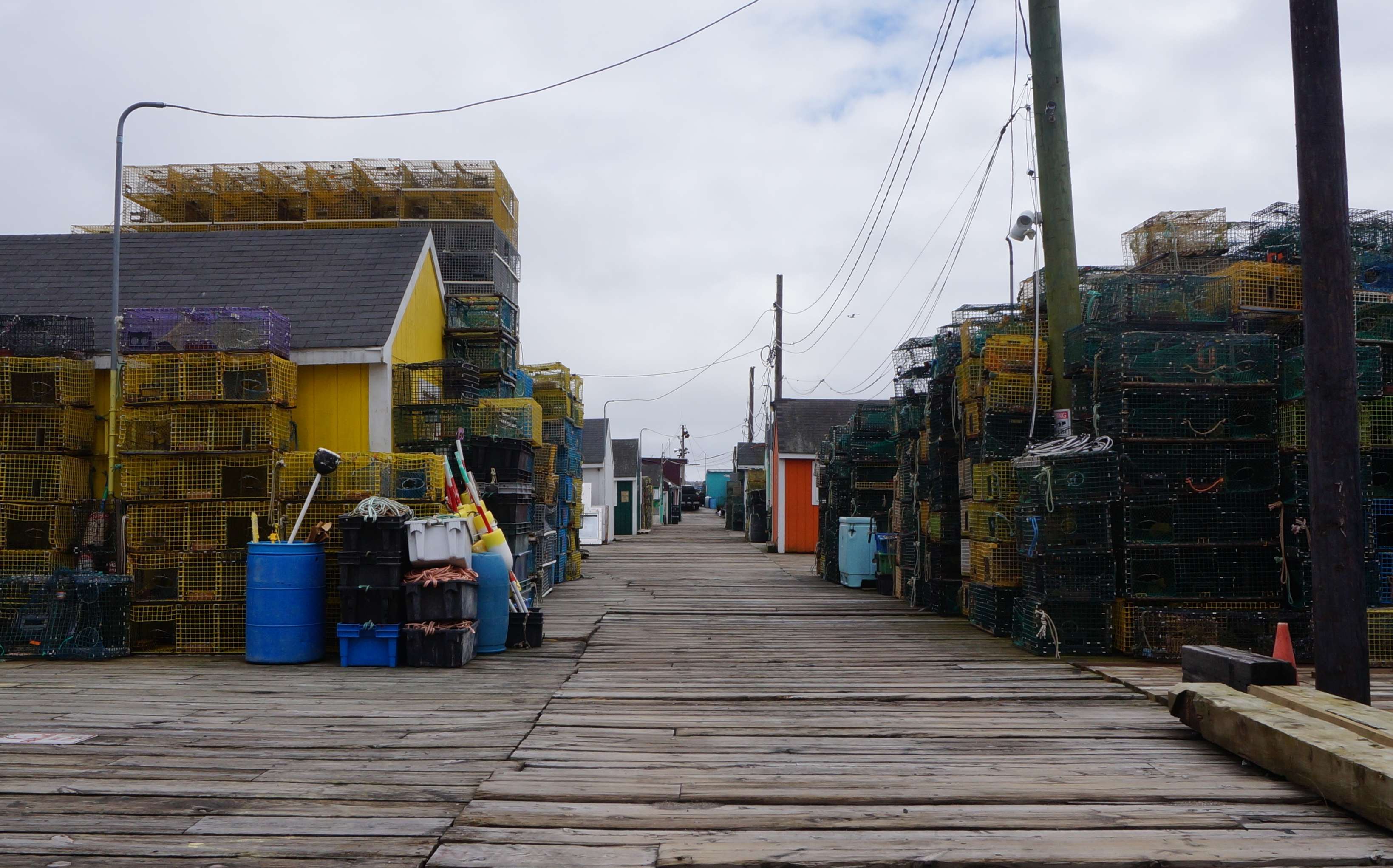
'What could have been'
By this month, it was clear that the zoning changes would move forward without that happening.
David Bateman, president of Bateman Partners, sent a letter to City Manager Jon Jennings on April 17 saying that while he appreciated the city's work and felt the firm had a voice in the process, the fishermen never agreed to meet with the developers.
Bateman said in the letter he supports the fact Portland must protect and preserve the working waterfront, fishermen must maintain or expand their role, and a proper balance includes "honoring the invaluable legacy of the fishing industry." But he added, "Without enough revenue, infrastructure for fishing operations deteriorates," and that the revenue from commercial development is needed to maintain the economic foundation.
That letter wasn't mentioned at Tuesday's planning board meeting, and Jennings didn't immediately respond to an email request to comment.
Tuesday a post went up on the Bateman Partner's website titled, "Do you REALLY know what was proposed at Fisherman's Wharf?"
The post said a new proposal, alluded to in January when the hotel plan was withdrawn, was presented to a focus group in December, but no one else has seen it.
"No fishermen, no lobstermen, nobody on the Planning Board, no City Councilors, no reporters," the post said. "The reason for that? We felt strongly that we needed to extend the courtesy of running these ideas by the fishing community first, face to face, before taking the more formal step of going to the Planning Board. A meeting with representatives of the fishing community hasn’t happened yet."
Bateman said the proposal was withdrawn in January so the Waterfront Working Group could "do its work."
"The Planning Board is considering more restrictive zoning along the waterfront," Bateman wrote. "As the Board considers reducing the value of commercial properties, and thus reducing the tax revenue generated to help pay for the upkeep of the working waterfront’s infrastructure, now seems like an appropriate time to outline what we had been thinking. If for no other reason than ideas like this — in general — should be part of the discussion as the community plans the future of the working waterfront.
The blog post outlines what the plan redesign included: Approximately $2 million for dedicated infrastructure upgrades to the working waterfront and more parking an access for fishermen.
It also called for a "Maine Sustainable Seafood Center” that would have included processing of seafood landed by local fishermen, sale of seafood landed by local fishermen, a "Coastal Culinary Academy” and “R&D Kitchen” for culinary research & development focused on fresh Maine seafood and more.
Commercial plans included a “Maine Sustainable Seafood Raw Bar,” which would have been a restaurant serving innovative and traditional Maine seafood dishes, "tracing each bite to Maine farmers and fishermen," an “International Maine Seafood Chef of the Year” and a "Maine Fisherman Hall of Fame,” featuring storytelling, curated photographs, artifacts, and more.
"We had hoped to work with our neighbors to establish an open-air fresh seafood and working waterfront market, in kiosks or under tents along on a Portland wharf," the blog post said.
"In summary, encourage collaboration among all working waterfront organizations to transform the waterfront into 'must-see' destination for children, tourists, chefs and journalists all over the world," the blog post said.
It would also have included a “new and prime viewing spot at the working waterfront and a new 12,400 square foot boardwalk and park along Fisherman’s Wharf, getting pedestrians off Commercial Street, allowing visitors to get right to water’s edge."
Development of the wharf would increase in tax revenue from $28,000 annually that the parking lot that's there now generates and it would be "another property generating robust funds for a TIF fund dedicated to current maintenance needs and future improvements to the infrastructure serving Portland’s working waterfront."
Robinson said once the city decides on zoning, a new plan may be formed.
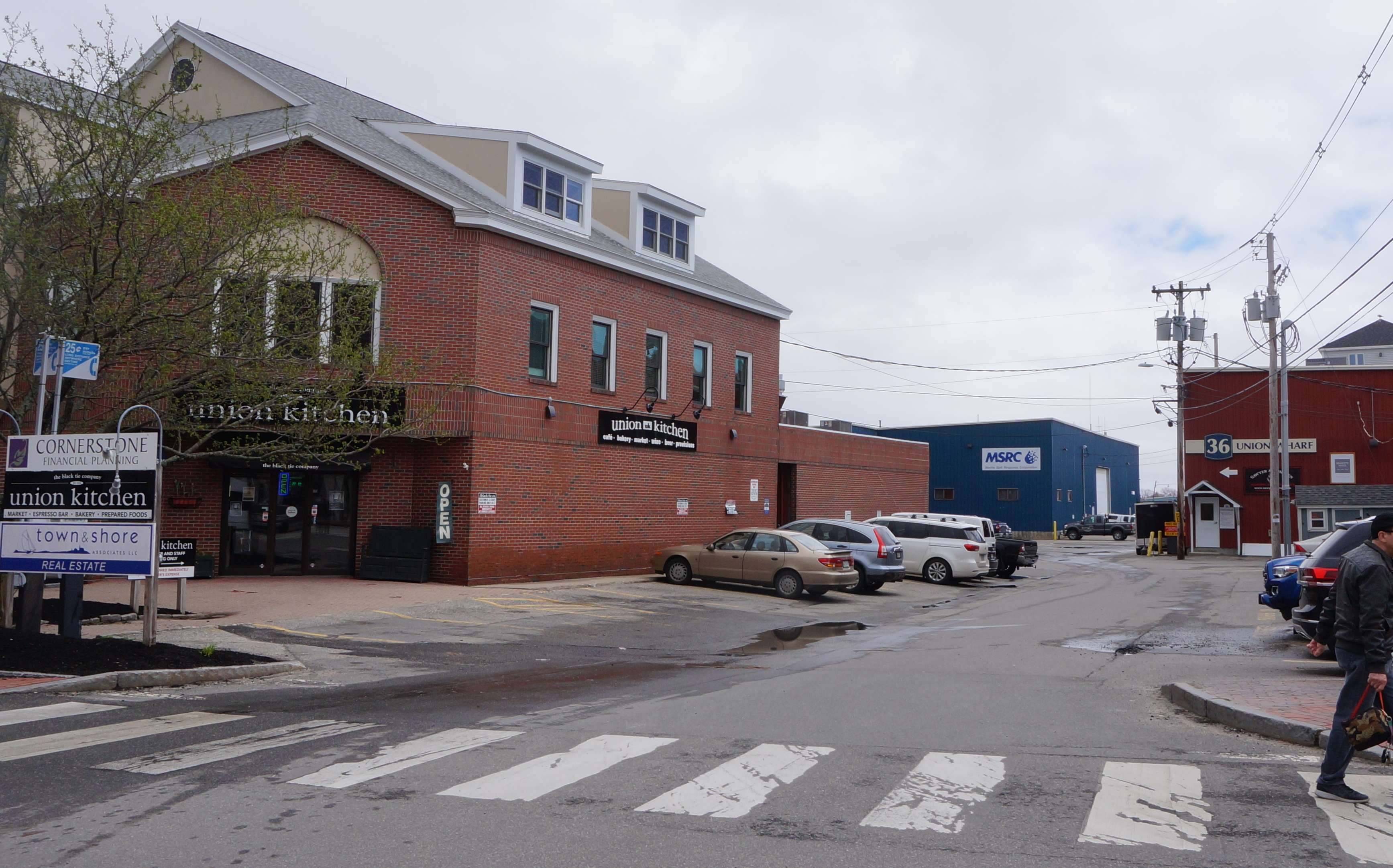
City moving forward
It's been publicly acknowledged the Fisherman's Wharf hotel plan is what prompted the calls for a referendum, the Waterfront Working Group, the moratorium and the proposed zoning changes. But the project was mentioned only in passing oblique references during Tuesday's two and a half hour workshop.
"I know we're here largely because of a hotel project," one city staffer said in passing. That's what as close at anyone came.
As the board listened to public comment, much of which will likely be repeated at the official public hearing on the changes, then discussed the details of the proposed amendments, it was clear that the process would move forward.
Those who opposed the changes, including wharf and business owners, said the 2010 zoning rules are working.
Roger Hale, of General Marine Construction Corp., said there is a "tremendous cost" to keeping the piers maintained. "The money has got to come from somewhere," he said.
Ken MacGowan, owner of Custom House Wharf, said, "As a property owner I feel like we're not being heard anymore."
But others, including lobstermen Willis Spear and Bill Coppersmith, both of whom are on the Waterfront Working Committee, pressed the importance of preserving the working waterfront.
"We may tie up at the wharf, but we support the top of the wharf," Coppersmith said.
Becky Rand, owner of Becky's Diner, echoed what some others had said: "Access for fishing can only be [on the waterfront]; hotels can be anywhere."
He said that other issues, including traffic and parking, also have to be addressed.
"We're looking at the traffic issue separate from zoning," he said. "I don't believe zoning is going to do all the work" of fixing the issues.
Bateman, too, in his April 17 letter to Jennings said that traffic was the big issue, not zoning.
"Let's face it, everyone's major gripe, including the fishermen, is traffic," he said. "Commercial Street is a very successful and busy place, and therefor it has a traffic problem."
Matt Grooms, city planner, told the board that one of the goals of the amendments was to eliminate some of the "large generators" of traffic.
Needelman, the waterfront coordinator, said that while the Waterfront Working Group didn't always agree, the members did agree that retail doesn't belong on the wharves. An exception would be retail tied directly to marine uses.
City planning officials stressed that the zoning amendments are to find a balance between the working waterfront and commercial development.
Trimming the non marine overlay district — which would be renamed the Commercial Street Overlay Zone — would have the effect of orienting retail toward Commercial Street and away from the wharves, Needelman, the waterfront coordinator, said.
Needelman said that one of the places non marine use integrated well is the Union Wharf project, three buildings with 45,000 square feet of office, retail and restaurant space, is an illustration of how the balance of non marine uses can fit in.
"It's about recalibrating the balance," he said.
Editor's note: The original version of this story misrepresented the status of the Fisherman's Wharf plan.
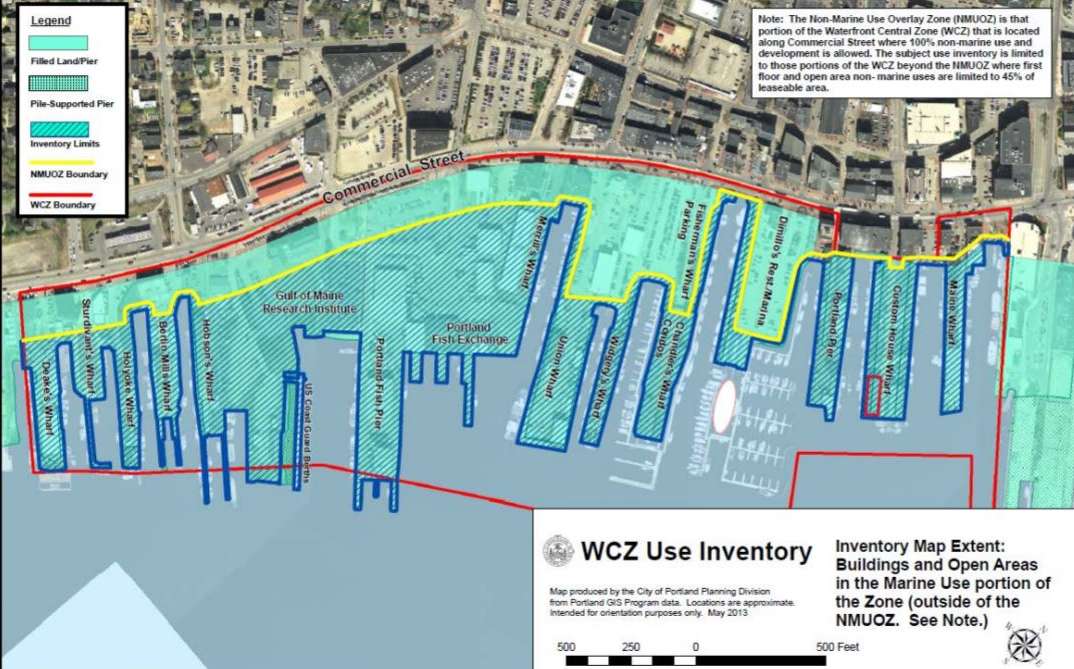










0 Comments